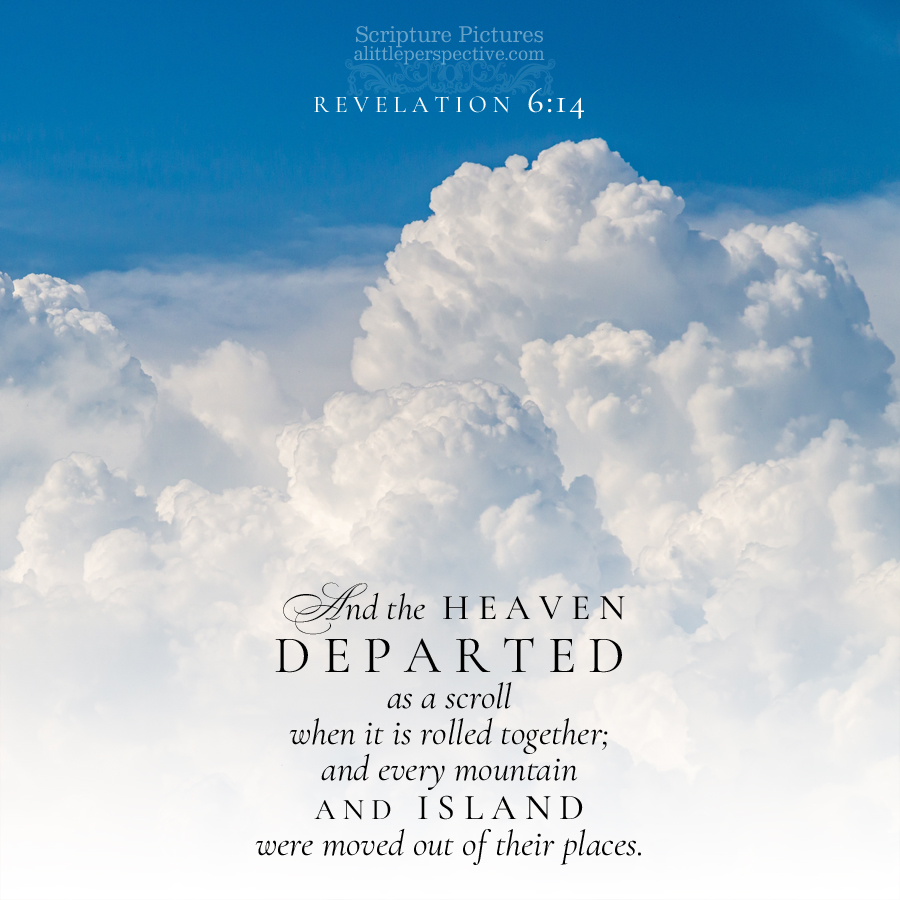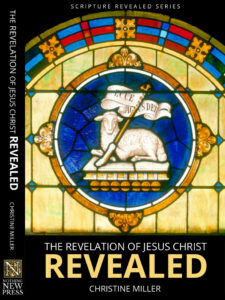Read Revelation 6 at Bible Gateway.
Revelation 6, The first six seals
Revelation 6, The second seal
Revelation 6, The third seal
Revelation 6, The fourth seal
Revelation 6, The fifth seal
Revelation 6, The sixth seal: The great earthquake
Revelation 6, The sixth seal: Sun and moon in eclipse
Revelation 6, The sixth seal: Stars from heaven fallen
Symbols of the sixth seal:
1) great earthquake (Rev 6:12): great shift of tectonic proportions realigning all earthly order in government, society, religion, and worldview;
2) sun and moon in total eclipse (Rev 6:12): Diocletian, the Invincible Sun Emperor, removed from power, and his dual emperor system completely discarded;
3) stars of heaven fallen to earth (Rev 6:13): principalities as pagan deities and their temples abandoned;
4) sky receded as a scroll (Rev 6:14): the spiritual authority of paganism lost all influence.
mountains and islands
The symbol of mountains and islands is not identified here, so that usually means it has appeared already in prophetic Scripture:
“You watched while a stone was cut out without hands, which struck the image on its feet of iron and clay, and broke them in pieces. Then the iron, the clay, the bronze, the silver, and the gold were crushed together, and became like chaff from the summer threshing floors; the wind carried them away so that no trace of them was found. And the stone that struck the image became a great mountain and filled the whole earth.” Dan 2:34-35
“And in the days of these kings the God of heaven will set up a kingdom which shall never be destroyed; and the kingdom shall not be left to other people; it shall break in pieces and consume all these kingdoms, and it shall stand forever.” Dan 2:44
Daniel’s interpretation of the mountain, is a strong kingdom. In his particular instance it was the kingdom of heaven, but this is the precedent set in prophetic Scripture that mountains are symbols for kingdoms.
Islands appear only twice in the Hebrew Scriptures:
And King Ahasuerus imposed tribute on the land and on the islands of the sea. Est 10:1
It shall come to pass in that day That the Lord shall set His hand again the second time To recover the remnant of His people who are left, From Assyria and Egypt, From Pathros and Cush, From Elam and Shinar, From Hamath and the islands of the sea. Isa 11:11
In other words, the phrase “islands of the sea” means that the king imposed tribute on all nations, even to the uttermost ends of the known world; and that the LORD will bring His people back from all nations, even from the uttermost ends of the world.
It seems as if mountains are kingdoms, and islands nations, even to the uttermost ends of the world. So let’s see if the history of the sixth seal, Diocletian’s reign and its aftermath, confirms this:
Diocletian became emperor in 284 ad. He deprived the Roman senate of all power except that of governing the city of Rome, so that the once- glorious senate, the check and balance to the tyranny of the Roman rulers, was now reduced to the status of a mere city council. Besides the disasters which the horsemen of the apocalypse inflicted on Rome, the removal of the Roman senate from power was the first blow to the authority of Rome, which had been a seat of power for over 1000 years.
Now Diocletian spent much of his tenure in war with Persia, so he lived and ruled from Nicomedia, in Asia Minor. It was there that the imperial court gathered. He appointed a co- emperor, as we have seen, who did not govern from Rome either, but Milan. Thus the removal of the imperial court from Rome was the second blow to the authority of Rome.
Now the old Roman empire took existing nations and peoples under its authority, without changing things too much. They acted just as the empires of the Greeks, Persians, Babylonians, Assyrians, and Egyptians which came before them had. The nation might have a Roman governor, garrison Roman troops, and pay taxes to Rome, but its native nobility and civilization were often maintained in place. Thus for all appearances life went on much as it had, as long as proper respect and deference (and tribute) were paid to Rome.
Diocletian changed that. He subdivided the existing provinces into approximately one hundred, all told, nearly twice what it had been. The provinces were furthermore organized into twelve “dioceses,” or seats of authority. Diocletian and his successors then organized the business of each province in the hands of a great number of local officials graded into many ranks and classes from high to low. There were vicars, each in charge of a diocese, and many other lesser officials to rule successively smaller areas of concern. He birthed a bloated civil bureaucracy, to restore order after the years of civil unrest and military excess. Thus boundaries, seats of governments, and rulers all radically changed from the nations and patterns they had followed for millennia.
Under this system, Italy was reduced to the position of a taxed province and had lost all of its former superiority over the other provinces of the Empire. Thus the third blow to the authority of Rome — its loss of its privileged status — was only cemented when Constantine established the new imperial seat at Constantinople. Within a generation after Constantinople was founded, the Roman Empire had become two distinct states in fact, if not in name.
Thus from 284 AD, “every mountain and island was moved from its place.”
the wrath of the Lamb
And the kings of the earth, the great men, the rich men, the commanders, the mighty men, every slave and every free man, hid themselves in the caves and in the rocks of the mountains, and said to the mountains and rocks, “Fall on us and hide us from the face of Him who sits on the throne and from the wrath of the Lamb! For the great day of His wrath has come, and who is able to stand?” Rev 6:15-17
These verses indicate that the entire earthquake and upheaval is identified with Jesus Christ. Remember that those who dwell on the earth, in Revelation, are the unbelievers, and those who dwell in heaven are the believers, whether living in heaven or in earth. So we have a picture of the unbelievers, from kings through slaves, trembling in fear from the wrath of the Lamb, knowing that their time is at an end.
Constantine so conquered his enemies, under the banner of the cross, and in the name of Jesus Christ, that the pagan emperors began calling on the God of the Christians to help them in battle! The pagan Romans, small and great, knew their own history well enough. They knew that Diocletian and just spent ten years so harshly persecuting the Christians, that the blood of the martyrs flowed freely and thickly, so much so that even the jaded Romans grew tired of the great slaughter. They knew that no persecution like it had been seen in the Roman Empire, even though they were well aware that nine other terrible persecutions preceded it.
They justly feared the armies of Constantine, or the armies of the Lamb, as it seemed to them, bearing down on them and decisively winning victory after victory.
Return to Revelation Index of Studies
Christine’s book The Revelation of Jesus Christ Revealed, based on these studies but greatly expanded, is now available from Nothing New Press. You may also be interested in reading the Book Extras and joining in on the Discussion.
As well, Revelation in Chiastic Structure is also available.


















Leave a Reply